Thursday, May 7th 2020

AMD B550 Chipset Detailed, It's Ready for Zen 3, Older AM4 Motherboards not Compatible
In their briefing leading up to today's Ryzen 3 3100 and 3300X review embargo, AMD disclosed that its upcoming "Zen 3" 4th generation Ryzen desktop processors will only support AMD 500-series (or later) chipsets. The next-gen processors will not work with older 400-series or 300-series chipsets. This comes as a blow to those who bought premium X470 motherboards hoping for latest CPU compatibility running into 2020. At this time only B550 is available, but we expect more news on enthusiast chipsets as the Zen 3 launch date comes closer. AMD B550 is a fascinating new mid-range chipset by AMD. Launching today as a successor to the popular B450 chipset, B550 is a low-power silicon with roughly the same 5-7 W TDP as the older 400-series chipset. Although AMD won't confirm it, it's likely that the chipset is sourced from ASMedia. It brings a lot to the table that could draw buyers away from B450, but it also takes some away.
The AMD B550 currently only supports 3rd generation Ryzen "Matisse" processors. Ryzen 3000 "Picasso" APU are not supported. What's more, older Ryzen 2000 "Pinnacle Ridge," "Raven Ridge," and first gen Ryzen 1000 "Summit Ridge" aren't supported, either. The Athlon 200 and 3000 "Zen" based chips miss out, too. AMD argues that it ran into ROM size limitations when trying to cram AGESA microcode for all the older processors. We find that hard to believe because B450 motherboards with the latest ComboAM4 AGESA support 2nd gen and 3rd gen processors, including APUs and Athlon SKUs based on the two. On the bright side, AMD assured us (within its marketing slides for the B550), that the chipset will support upcoming processors based on the "Zen 3" microarchitecture. The company also came up with a new motherboard packaging label that clarifies that the processors won't work with the 3400G and 3200G.AMD B550 motherboards will feature partial PCI-Express gen 4.0 support. The main PCI-Express x16 slot, and one of the M.2 NVMe slots that are wired to the "Matisse" processor will be PCI-Express gen 4.0, however, all downstream PCIe lanes put out by the B550 chipset are gen 3.0. This is still a step up from 400-series "Promontory" chipsets, which are limited to gen 2.0. B550 puts out eight PCIe gen 3.0 lanes, which combine with the 20 usable processor lanes from "Matisse" to take the platform's total PCIe budget to 28 lanes (x16 gen 4.0 + x4 gen 4.0 + x8 gen 3.0). The B550 chipset itself connects to the "Matisse" processor via a PCI-Express 3.0 x4 connection.
In terms of connectivity, AMD's B550 chipset puts out up to six SATA 6 Gbps ports with AHCI and RAID capability; two each of 10 Gbps USB 3.2 gen 2 and 5 Gbps USB 3.2 gen 1 ports; and six USB 2.0 ports. PCIe, SATA, and USB connectivity from the "Matisse" processor is unchanged: four 10 Gbps USB 3.2 gen 2 ports, and up to two SATA 6 Gbps ports.The processor includes a PCI-Express 4.0 x16 PEG connection that can be split between slots. AMD is allowing motherboard designers to have multi-GPU capability with the B550, where the x16 PEG link is split between two x16 slots (electrical x8). Previously this capability was limited to the top-tier X370 and X470 boards. The processor also puts out one PCI-Express 4.0 x4 link meant to drive one M.2 NVMe slot or U.2 NVMe port. Every B550 motherboard we've seen so far features one M.2 PCIe gen 4.0 x4 (64 Gbps) slot.As with both its predecessors, the B350 and B450, the new B550 chipset enables full multiplier-based CPU overclocking, along with broad memory overclocking support. Motherboard designers are at liberty to kit out the B550 with the most elaborate CPU VRM solutions. Expect some of the pricier B550 boards to match their X570 counterparts in overclocking capability.
Motherboards based on the AMD B550 chipset are expected to launch on June 16, 2020. Prices start at $100, according to AMD.
The AMD B550 currently only supports 3rd generation Ryzen "Matisse" processors. Ryzen 3000 "Picasso" APU are not supported. What's more, older Ryzen 2000 "Pinnacle Ridge," "Raven Ridge," and first gen Ryzen 1000 "Summit Ridge" aren't supported, either. The Athlon 200 and 3000 "Zen" based chips miss out, too. AMD argues that it ran into ROM size limitations when trying to cram AGESA microcode for all the older processors. We find that hard to believe because B450 motherboards with the latest ComboAM4 AGESA support 2nd gen and 3rd gen processors, including APUs and Athlon SKUs based on the two. On the bright side, AMD assured us (within its marketing slides for the B550), that the chipset will support upcoming processors based on the "Zen 3" microarchitecture. The company also came up with a new motherboard packaging label that clarifies that the processors won't work with the 3400G and 3200G.AMD B550 motherboards will feature partial PCI-Express gen 4.0 support. The main PCI-Express x16 slot, and one of the M.2 NVMe slots that are wired to the "Matisse" processor will be PCI-Express gen 4.0, however, all downstream PCIe lanes put out by the B550 chipset are gen 3.0. This is still a step up from 400-series "Promontory" chipsets, which are limited to gen 2.0. B550 puts out eight PCIe gen 3.0 lanes, which combine with the 20 usable processor lanes from "Matisse" to take the platform's total PCIe budget to 28 lanes (x16 gen 4.0 + x4 gen 4.0 + x8 gen 3.0). The B550 chipset itself connects to the "Matisse" processor via a PCI-Express 3.0 x4 connection.
In terms of connectivity, AMD's B550 chipset puts out up to six SATA 6 Gbps ports with AHCI and RAID capability; two each of 10 Gbps USB 3.2 gen 2 and 5 Gbps USB 3.2 gen 1 ports; and six USB 2.0 ports. PCIe, SATA, and USB connectivity from the "Matisse" processor is unchanged: four 10 Gbps USB 3.2 gen 2 ports, and up to two SATA 6 Gbps ports.The processor includes a PCI-Express 4.0 x16 PEG connection that can be split between slots. AMD is allowing motherboard designers to have multi-GPU capability with the B550, where the x16 PEG link is split between two x16 slots (electrical x8). Previously this capability was limited to the top-tier X370 and X470 boards. The processor also puts out one PCI-Express 4.0 x4 link meant to drive one M.2 NVMe slot or U.2 NVMe port. Every B550 motherboard we've seen so far features one M.2 PCIe gen 4.0 x4 (64 Gbps) slot.As with both its predecessors, the B350 and B450, the new B550 chipset enables full multiplier-based CPU overclocking, along with broad memory overclocking support. Motherboard designers are at liberty to kit out the B550 with the most elaborate CPU VRM solutions. Expect some of the pricier B550 boards to match their X570 counterparts in overclocking capability.
Motherboards based on the AMD B550 chipset are expected to launch on June 16, 2020. Prices start at $100, according to AMD.
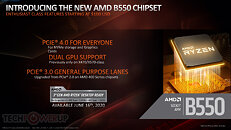
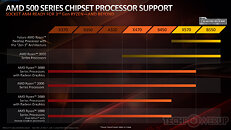
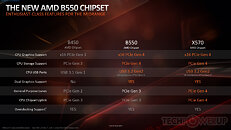
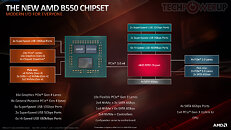
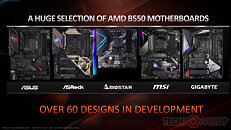
434 Comments on AMD B550 Chipset Detailed, It's Ready for Zen 3, Older AM4 Motherboards not Compatible
Informations are for 17% IPC uplift ON AVERAGE + 6-7% clock uplift.
I expect, fully expect the 12-core Ryzen 4900X to be as fast as Ryzen 9 3950X.
Your so stuck in said perspective you can't see common sense.
And now you know what everyone wants.
Your wasting my time.
Still no proof anyone at AMD garaunted every CPU on every socket.
Just your perspective.
Stick it mate ,you know f all, and are a troll.
AMD said AM4 would've been supported until 2021, but again what use could it be if i have to swap my motherboard regardless?
Here's a Google DOC comparing ROM chip sizes from B350/X370, B450/X470 and X570 mobos:
docs.google.com/spreadsheets/d/1wmsTYK9Z3-jUX5LGRoFnsZYZiW1pfiDZnKCjaXyzd1o/edit#gid=2112472504
As you can see, X570 mobos come with both 16MB ROM chips and 32 MB.
More to the point, even B350/X370 along with B450/X470 mobos also come with same sized ROM chips (depending on the mobo of course).
So, ROM chip size doesn't seem to play that much of a part... unless of course the microcode update for Zen 3 is so huge that it needs to eliminate every single previous Zen CPU (Zen1,+ and Zen2)... which is something I very much doubt because even X570's come with only 16MB ROM's.
Before Zen 2 debuted, a similar problem occurred, but it wasn't AMD who said they won't support it, it was the OEM's who created the problem of giving too small ROM chip sizes and packing the ROM's with graphically intensive UI's
But it was found that stripping those UI's to the more basic graphical representation freed up more than enough space for Zen 2 microcode updates on 16MB ROM's (which is what the mobo manufacturers did).
Heck, even my Acer Helios 500 PH517-61 has a Ryzen 2700 and Vega 56... its a desktop replacement with a proprietary B450 mobo that has a 16MB ROM chip.
Acer's BIOS/UEFI UI is rather basic (dates back to DOS style represenation), but as a result, mere 47% of the ROM chip is used... which is not even half.
Acer unfortunately stopped supporting this unit shortly it was released, so I never got a BIOS upgrade path to Zen 2 (even though they could have integrated it - and the cooling in this unit has been specifically reworked for AMD which means its running cool and quiet - even under maxed out load - so it would be able to handle both Zen 2 and Zen 3 - at least CPU's up to 65W TDP).
If ROM chip sizes are an issue for some motheroboards, why doesn't AMD leave it to the mobo manufacturers instead like they did before?
In the case of 16MB ROM chips, support for Zen 1 CPU's could be taken out (but warn users that those on B350/X370 mobos with this update and if they are still running Zen 1 would be advised to use a loaner/cheap CPU of say Zen+ variety at least which is cheap just to get through the BIOS update).
your on an i7 2600k you will have to swap your motherboard anyway. definitely, and ill let you into some advice I learned.
no matter what anyone says support past 1 year is not guaranteed EVER ITS DOWN TO THE OEM BOARDMAKER many of whom dont give the slightest of shits because they make money on NEW boards, support for upgrades beyond 2-3 years is exceptionally rare.< those are facts with no proof too.
www.techpowerup.com/forums/threads/amd-b550-chipset-detailed-its-ready-for-zen-3-older-am4-motherboards-not-compatible.266710/page-10#post-4260188
I really hope some boards will be supported for the 4000 series.
So tell me why state you plan to support AM4 until 2021 in consumer addressed events, because i still haven't received an answer.Saw it, and again if they come out and they're perfectly compatible it'll be best for everyone, but for now facts are telling us we might not see compatibility for 4000 series on <500 series motherboards
You advised people wrong, send them my way next time I'm not deluded, I read information better.
We all here had these kind of arguments when x570 came out and x470 became the poor cousin in support terms a year ago.
As such, just because the slide says Ryzen 4000 series CPUs won't work in X370 / X470 boards doesn't necessarily mean they won't actually work.
No i advised people correctly, because i AMD said "upgrade your processor without buying a new motherboard" and that's exactly my point, NOT needing to swap motherboards.